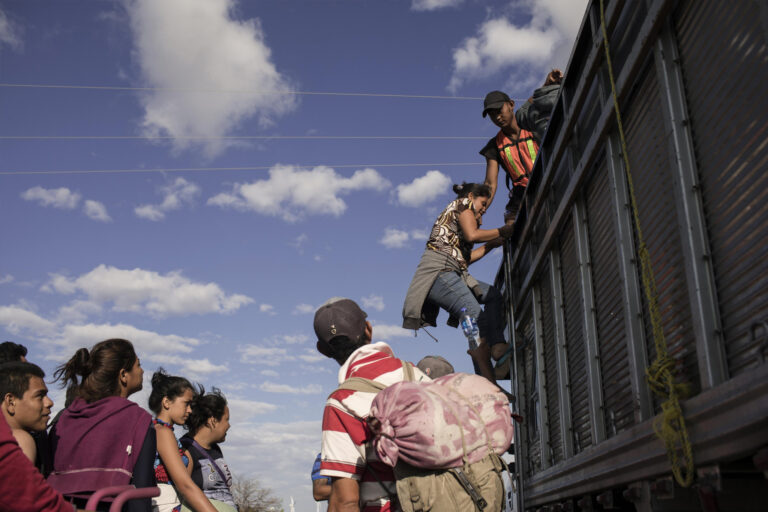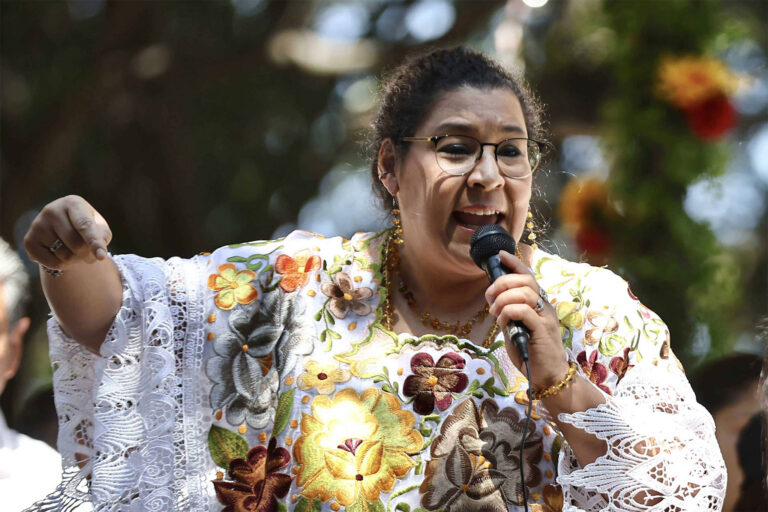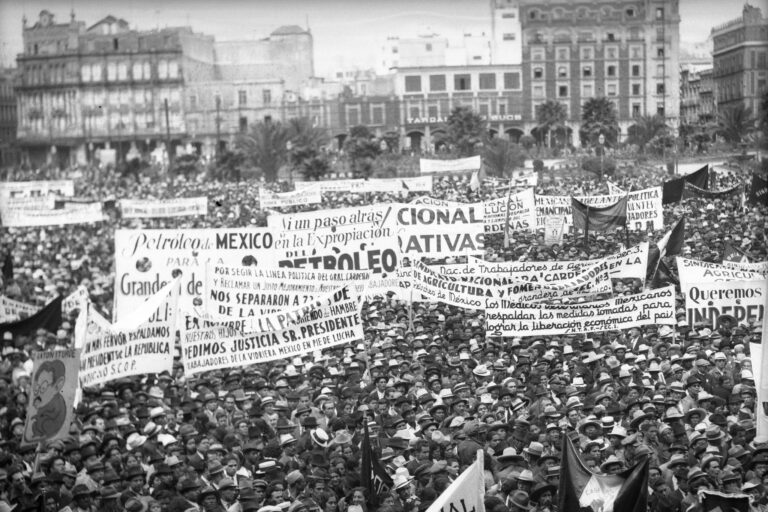A Manicure with a Machete
This article by René González appeared in the 296th issue of Memoria: Revista de Crítica Militante. We thank Memoria for permission to reprint the article and encourage you to support Memoria and the Center for Studies of the Labor and Socialist Movement. The views expressed in this article are the author’s own and do not necessarily reflect those of the Mexico Solidarity Project.
On Sunday, May 4, the Sixth Session of the Morena National Council was convened. This governing body, which between each National Congress has the authority to formulate recommendations, critiques, and action plan proposals for the following period, was present. The meeting was attended by all 364 national council members, including those from the party’s grassroots elected through the National Congress, Morena presidents and general secretaries in the country’s 32 states, the National Executive Committee, Morena governors, and emeritus council members.
Attendees were already familiar with the agenda and the sole point of discussion: “Guidelines for Ethical Behavior for Representatives, Public Servants, Protagonists of True Change, and Morena Members,” which will be disseminated as the Morena Ethical Guidelines from that day forward. A few months into the second six-year term of the Transformation, it is more than opportune to reflect on the coordinates for the next period. This is a new chapter in the age-old discussion between principles and pragmatism; between an old and new political culture.
Before the session, small groups of advisors commented that the boiling point had been reached because, in her field trips across the country, the President of Mexico Claudia Sheinbaum had encountered a host of concerns, complaints, doubts, and observations about the actions of various political actors elected under the Morena party banner. In this regard, Dr. Claudia Sheinbaum issued a pointed and forceful appeal through a letter—now in the public domain—addressed to Morena leaders, echoing the sentiments of activists and supporters of the profound Fourth Transformation of Mexico.
The May 4th conclave reminds us of other significant moments within Obradorism, when the dilemma between endorsing the essence of the movement (fighting wholeheartedly for true change) or allowing deviations and errors causing the collective ship to lose its compass was also evident.

In 1997, the then national president of the PRD, Andrés Manuel López Obrador, had achieved the best electoral results for a leftist party in recent history (except for 1988, when it wasn’t a party but rather the coalition grouped within the National Democratic Front (FDN). After the elections, the leader gathered the winning mayors—the PRD having claimed victory in the nation’s capital and in important municipalities (until that year PRI strongholds) such as Ciudad Nezahualcóyotl—and warned them: “Whoever starts with nonsense and farce, whoever steals like our adversaries, we’ll give them a manicure with a machete.”
It was an initial call, in the colloquial language of the Tabasco native, to practice ethics in politics. Famously, as president of the PRD, López Obrador had allocated the majority of his prerogatives—a result of the electoral growth in 1997, as he went from obtaining 16.59% of the votes in 1994 to 24.96% in 1997—to a fund for the widows of the more than 670 PRD militants murdered between 1989 and 1997, to offices for migrants in the United States, and to free textbooks in municipalities governed by the PRD.
Since the 2006 campaign, López Obrador has expressed his concern both publicly and privately about the need for a broad, incorruptible team, free from individualism and sensitive to the arduous task of rebuilding the country. “Leaders aren’t enough. Juárez was surrounded by liberals, a generation of men who seemed like giants,” he often said.
In 2010, in the midst of Felipe Calderón’s war, the thesis of a loving Republic was proposed from the heart of the Obradorism. In the face of the hatred and violence unleashed by the ruling PAN, it was proposed that the people should reclaim ethical, moral, and community values; it would be necessary to combat the moral degradation fostered by neoliberalism, but also to reclaim, from a personal perspective, ethics as the essence of politics, and deconstruct the old PRI political culture, which operated under the maxim: “He who does not compromise does not advance.”
On December 6, 2011, AMLO presented the foundations for a loving republic, which were enriched in the spring of 2012 by intellectuals, academics, and artists such as Hugo Gutiérrez Vega, Enrique Dussel, Alfredo López Austin, Elena Poniatowska, Rafael Barajas “El fisgón,” Miguel Concha, Guillermo Briseño, Raquel Serur, and Marta Lamas, among others, during the Congress for a Loving Republic held at UNAM. Among other discussions, the role of the protagonist of true change was addressed, as AMLO made a cardinal reference:
“In the towns of Oaxaca, for example, community members practice their religious beliefs and, at the same time, work on public works and in government positions, without receiving a salary or wage, motivated by the moral principle that one must serve others, the community. Individualism does not dominate; a person’s worth is not what they have or the material goods they accumulate, but rather the prestige they achieve after proving their vocation for service, their rectitude, and their love for their fellow human beings, and that is their greatest reward on earth.”

At Morena’s 6th Session of the National Council, there is expectation, but also a sense of triumph, permeating the spirits of the movement’s rank and file who have read the document. The party president, the general secretary of the National Executive Committee, the director of the National Institute for Political Training, and several governors read the eight sections of the Ethical Guidelines: Preamble, Considerations, General Provisions, I. Republican Austerity and Vocation to Serve, II. Independence from the Powers That Be, III. Respect and Equality Among Members, IV. Prohibition of Nepotism, and V. Democratic Values.
The document specifies behaviors contrary to the movement, which under other circumstances might be considered common sense for a party that emerged from social and leftist struggles. However, making them explicit is perhaps the value of the guidelines against those who—from the perspective of legalistic politicking—act under the premise that “what is not expressly prohibited is permitted.”
Conduct contrary to the party’s principles is highlighted, for example: “Promoting consumerism or displaying signs of material ostentation such as jewelry, exclusive designer clothing, high-value properties or cars, luxury restaurants or tourism, among other extravaganzas. The trappings of power belong to a past of corruption and privilege; “Morena is humility,” or “Using one’s position to solicit or promote exclusive deals, privileges, or perks, behaving with arrogance or haughtiness, or humiliating or belittling others” is forbidden.
The guidelines were approved unanimously. This is undoubtedly a great leap forward in the transition to the second floor of Transformation. Applause erupted, and smiles—and even hugs—were seen throughout the room. The council members took photos and selfies showing the cardboard sign approving their vote.
Curiously, skepticism was evident on the faces of two extremes: on one side are those who—since their PRI origins—have conducted their political activities with an addiction to the trappings of power, cronyism, and a certain effrontery—which they display with sarcastic smiles; and on the other side are the militants who have arrived as representatives of their districts on the National Council with genuine grassroots work. They appear satisfied but reserved, and their position can be summed up in a post-vote intervention, where several voices stated: “A paper can say anything, but who guarantees it?”
The challenges of maintaining “principles and political effectiveness,” of restoring ethics to politics in times of vigorous political and electoral growth of perhaps the most important party-movement in the world today, and of building a new political culture free from the excesses of the old political elites are a profound incentive for most of those attending the National Council. The new guidelines are part of a collective effort to “correct in time.” The task is to disseminate them and for the movement to adopt them. While Morena achieved major victories in the 2024 electoral process, it is no secret that it lost 17 of the 29 capital cities in dispute, in a context where accusations of reproducing old political practices distanced urban centers from the looming transformation.
-
Let’s Talk About Migration: Trumpist Persection
Millions of women who have endured unspeakable violence on their migration journey are now being persecuted in the United States by an extremely xenophobic and misogynistic government, led by Donald Trump,
-
Genocidal & Extractive Capitalism
This week, the United States claimed to be negotiating to avoid war with Iran. It was merely a cover for a new attack. Where are the efforts to stop it?, asks Mexican Supreme Court Minister Lenia Batres.
-
Trump Will Not Take Our Oil
Venezuela’s oil belongs to the Bolivarian Republic. Mexican oil belongs to the people of Mexico. If the current administration decides to trade it with Cuba or any other country, it has every right to do so. Mexican oil does not belong to the US nor to Donald Trump.




